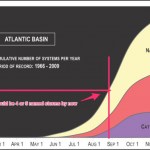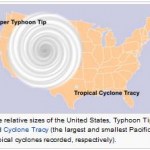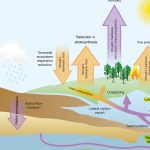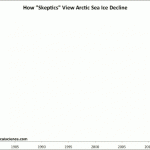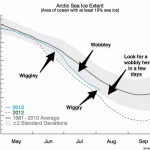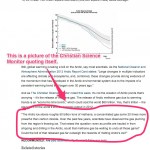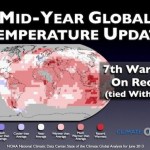Climate Change
First, watch it:
Then, go here to sign the petition!!!!!
A while back a few of us were talking about naming storms and droughts after climate denialists. Maybe this petition will help make that happen!
So, how has the Atlantic hurricane season shaping up so far?
According to data accumulated by the National Weather Service, as shown (with added items) here ...
... we should have had about four or five named storms at this point in the season. Since numbers for this time of year are small, variation is large, so this is not too meaningful but it can give us an idea.
So far, we have had these storms in the Atlantic:
Tropical Storm ANDREA
Tropical Storm BARRY
Tropical Storm CHANTAL
Tropical Storm DORIAN
Tropical Storm ERIN
The next storm will be named Fernand, and it may be forming as we…
Paul Douglas has also been following the Al Gore OMG Category Six!!1!!! discussion. Here's what he has to say about the thing I just wrote about:
I'm thinking we might need to add some degrees onto the thermometer next week!
These things are all connected.
A couple of days ago a good ally in the climate change fight ... the fight to make people realize that climate change is not some librul conspiracy to raise taxes on the rich ... goofed. It was a minor goof, barely a goof at all. We do not yet know the nature of the goof but it was somewhere between saying something in a slightly clumsy manner and a bit of misremembering something that happened in 2005 during an interview. That's it. Nothing else to see here.
But that goof has been wrenched form its context and turned into a senseless and embarrassingly…
The last several decades of climate change, and climate change research, have indicated and repeatedly confirmed a rather depressing reality. When something changes in the earth's climate system, it is possible that a negative feedback will result, in which climate change is attenuated. I.e., more CO2 could cause more plant growth, the plants "eat" the CO2, so a negative feedback reduces atmospheric levels of the greenhouse gas bringing everything back to normal. Or, when something changes in the earth's climate system, we could get a positive feedback, where change in one direction (…
Every northern summer Arctic Sea ice melts away and reforms for winter, but how much melts away seems to be increasing on average, at a rate that surprises climate scientists.
But there are some who see variation from year to year, and there is variation, in a rather unrealistic way. Here is a graph comparing how climate science denialists view arctic sea ice over time, compare to how "climate realists" (i.e., smart people who can read graphs and such) see it:
Go HERE to see the source and learn more about what is behind this graph.
Large ponderous entities like the IPCC or government agencies like NOAA take forever to make basic statements about climate change, for a variety of reasons. They are going to have to speed up their process or risk losing some relevance. Among the coming problems we anticipate with global warming will be events that have huge, widespread effects and that happen in time scales of weeks or months, or a season, and having a nice governmental report about it two years later isn't going to do anybody any good. So let's see to that problem, please (looking sternly at IPCC and NOAA).
But that's…
Remember those puddles at the North Pole that at first everyone said were not important, then when someone realized that they were only puddles so a new meme formed and everyone said they are not important? They're important. From the abstract of a new study, just out:
The surface albedo of the Arctic sea-ice zone is a crucial component in the energy budget of the Arctic region. The treatment of sea-ice albedo has been identified as an important source of variability in the future sea-ice mass loss forecasts in coupled climate models. ... Here we present an analysis of observed changes in…
From Nick Breeeze, "This video contains excerpts from interviews with Dr James Hansen. Here he gives his view on how we can get emissions from burning fossil fuels under control."
Follow Climate Crocks for regular updates on the Dark Snow project. Meanwhile, have a look at this TED talk.
This is a sea change, possibly one of the most important political changes to happen in US history. I've mentioned it before, we'll talk about it more, but for now, just watch this. Also, Michael Mann is interviewed:
Visit NBCNews.com for breaking news, world news, and news about the economy
WeatherNationTV Chief Meteorologist Paul Douglas looks at how climate change leads to rising sea levels and what coastal cities can expect to see by 2040. Also, more on torrential downpours and record setting rainfalls.
OK, so supposedly a fresh water lake has appeared at the North Pole and it is ENORMOUS and Santa Claus has been missing since and is presumed dead. OK, not really. The Giant Lake is really just a "pond" of meltwater on top of the polar sea ice, on the North Pole. But wait, actually, it is not really at the North Pole, it was photographed by some scientists who hang around the North Pole but this pond, which is small but was photographed with a wide angle lens, isn't really exactly at the North Pole anyway, and these ponds form there all the time in the summer.
But really, even though they…
This is a very important political ad because it involves climate change and climate change denialism in the political process. This (involvement) needs to happen in every single campaign from now on, for every single office. This is a start. A slow start, but at least a start.
There is important context for this ad that you can get HERE from Peter Sinclair.
Here's a presentation by Michael Mann that I'm sure you will enjoy:
UPDATE: Mass Coal Plant Protest Happening Now FOLLOW: @oharjo #summerheat #coalisstupid #CloseBraytonPt @350Mass @efeghali for updates.
UPDATE Brayton Point Coal Plant Protest Live Streaming HERE.
This morning, Sunday, July 28th, there is an action happening in Southeastern Massachusetts. A group of climate activists are going to shut down a coal plant and replace it with solar panels and wind generators.
Obviously the solar panels and wind generators will be mainly symbolic because you can't build a lot of large infrastructure while the police are bearing down on you. Indeed, local…
With J. Drake Hamilton, Shawn Otto, Greg Laden, and moderated by Desiree Schell.
The sound is messed up in the beginning, but gets much better after a while:
A full transcript, graciously and painstakingly produced by Avery Thompson, and other information about the panel, is HERE at Skepchick.
Please feel free to add comments or questions below, and I'll be monitoring comments at Skepchcick.org as well.
Most of the current models of glacial ice melting (and contribution to sea level rise) focus on ice melting and less than they need to on the process of glaciers falling apart in larger chunks such as ice bergs. Also, current understanding of glacial ice melting due to global warming indicates that the Western Antarctic Ice Sheet (WAIS) is more vulnerable to melting over coming decades or centuries than is the Eastern Antarctic Ice Sheet (EAIS). New research from two different teams seems to provide a major corrective to these assumptions.
First, about how glaciers turn into ocean water.…
The National Academies Press of the United States has recently released a report that will be of interest to those of you concerned with climate change (which better be every one of you dammit!). The report talks about increasing floods due to weather whiplash and sea level rise due to glacial melting (and subsidence), mainly in relation to the levees program and insurance, but also more generally. Here's a small excerpt to give you a flavor:
Community flood risk scenarios will continue to evolve as change occurs. Climate change will have a variety of regional impacts, and the geographic…
It has been said that global warming has stopped over the last several years. Some say it has not been happening for 17 years, some say for ten years, some say for 12 years. Let's test these hypotheses
Hypothesis: June, the most recent month with full data, was an average year, not a warm year.
Now that July is nearly over, we can look back at the data for June and see how warm or cool June was.
According to data from NOAA and NASA, summarized here,
June was one of the hottest such months on record globally...The month extended the unbroken string of warmer-than-average months to 340,…
